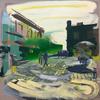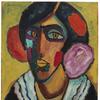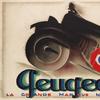Dollar bill signed by the outlaws Bonnie and Clyde is in an internet-only auction that ends March 1st
- BELTON, Missouri
- /
- February 02, 2016
BELTON, Mo. – A 1923 silver certificate dollar bill, signed by the notorious outlaws Bonnie and Clyde, examined and declared genuine by a respected and qualified document examiner, is the expected headliner in an internet-only auction now online and slated to end March 1st. The sale is being held by Mayo Auction & Realty. Items can be viewed and bid on now, at BidMayo.com.
The seller of the dollar bill is Anthony “Tony” Byram of Mexico, Mo. He said the dollar bill was signed by Bonnie Parker and Clyde Barrow after they ate lunch at his grandmother’s restaurant in Bowling Green, Mo., probably in the spring of 1933, at the height of their notoriety and while they were on the run from authorities. The bill was given to the cook, who later gave it to Byram.
Mayo Auction & Realty is no stranger to items connected to Bonnie and Clyde. In January 2012, the firm auctioned a pair of guns believed to have been owned and used by the pair: a .45 caliber Thompson sub-machine gun and a 12-gauge Winchester model 1897 shotgun. Then, in February 2013, it sold a Smith & Wesson revolver retrieved from their stolen car at the time of their death.
“Both of those auctions received enormous international attention, but you could make the case that the signed dollar bill is far more important, both historically and from the point of view of a collector, because Bonnie and Clyde signatures are so incredibly rare,” said Robert Mayo of Mayo Auction & Realty. “Only four are known to exist. One is from an arrest fingerprint card. We're not aware of another instance of a single document that contains both of their signatures.”
While the signed dollar is the sale’s undisputed star, other important items will also come up for bid. These include a dress personally owned and worn by Jacqueline Kennedy Onassis, while she was First Lady and living in the White House; and a Civil War-era copy of Harper’s Weekly that shows an unfinished Capitol building in Washington, D.C. on the cover. It's dated Aug. 23, 1862.
About 75 of the sale’s 100 lots will consist of rare and vintage posters, all of them deaccessioned by the Atchison Historical Society in Kansas. Most are circus posters, showing classic and wildly colorful images from the big name circuses of the day, such as Ringling Brothers and Barnum & Bailey. A few are 4th of July and rodeo-themed, and another is an Amelia Earhart stadium poster.
Also in the sale is an original copy of the Golden Dreams calendar from 1955, showing a nude Marilyn Monroe, with all the months intact; an original illustration by Louis S. Glanzman, the artist who drew numerous covers for TIME Magazine and whose artworks hang in the White House today; and an eagle statue fashioned from crushed pecans, from the Jimmy Carter Library.
The Jackie Kennedy dress would no doubt be the top lot in almost any other auction. It was made by hand for the First Lady by a Palm Beach, Fla., designer and is crafted of gold metallic mesh fabric trimmed in pearls, rhinestones and gold brading at the neck and bottom. It was consigned by the estate of Reba Hille, a family friend who was given the dress by Mrs. Kennedy as a gift.
But with all there is to see, consider and bid on, the spotlight will undoubtedly shine the brightest on the Bonnie and Clyde dollar bill, an item whose back story is as fascinating as the item itself. It begins with the outlaws, on the run, stopping for lunch at the Tick Tock Café, the restaurant that Lulu Byram ran in the 1920s and 30s, in Bowling Green, Mo., near the Mississippi River.
They sat down and both ordered the same thing: hot open-face sliced roast beef sandwiches, on two slices of white bread, green beans, mashed potatoes and brown gravy (cost: 25 cents apiece). Clyde drank iced tea; Bonnie asked for water. Lulu sauntered over and, in her usual friendly and engaging way, chatted with the two. The lunch was uneventful – until the two got ready to leave.
They walked up to the register, and when Clyde pulled back his coat a little to reach in for his money, he revealed two weapons: a shoulder pistol and a gun on his waistband. The cook – a man named Lemuel (his last name is lost to time), said, “Wow, mister, are you a G-Man?” (or government law enforcement official). Clyde replied, “No, but I guess I’ve killed me a few.”
Then Clyde asked Lemuel, “You don’t know who we are, do you?” Lemuel (“Lem”) shook his head no. When Clyde told him, Lem blurted, “Can I have your autograph before they kill you?” Clyde laughed and went to pay his tab. He produced a $20 bill, which Lulu couldn’t break. “No worries,” said Clyde. “Keep it. Those were the finest roast beef sandwiches we’ve ever eaten.”
Then, Clyde pulled out the 1920s-era dollar (larger than today’s), signed the front in pencil and handed it to Bonnie, who signed the back and handed it to Lem. They asked for sandwiches to go, which Lem made for them, then Lulu escorted them out the back door, to their waiting stolen car. “I don’t want any trouble, but I don’t want you two getting caught either,” she told them.
Fast forward to 1969. Lulu Byram suffered a stroke and went to live at Straubes Nursing Home in Bowling Green, Mo. Her grandson Tony (the seller) would go visit her there, and on one of his visits he learned, much to his surprise, that Lem the cook was also living there. From that day on, Tony would split his time between the two, first sitting with Lulu and then visiting with Lem.
On one visit, Lem said to Tony, “Go over to the top dresser drawer and look for an old envelope under my T-shirts.” There, in an envelope yellow with age, was the signed dollar bill, untouched for decades. “I want you to keep it,” Lem told him. “I’m afraid one of the nurses is going to steal it.” When Lem passed not long afterward, he had no heirs, so that left Tony the owner of the bill.
Stories are just stories until someone authenticates them, so naturally this tale required some serious vetting. The first to examine the bill was Curt Baggett, a forensic document examiner who compared the signatures to the other four existing ones and declared them real. The dollar bill will be accompanied by Mr. Baggett's letter of authenticity, which includes his signature.
Bonnie Elizabeth Parker met Clyde Chestnut Barrow in January 1930 and the attraction was both immediate and intense. For reasons only they know, the two embarked on a wild crime spree that began with small robberies and quickly escalated to bank jobs and the like. They were joined by friends and relatives and by the time they met their demise at least 13 people had been murdered.
Bonnie and Clyde’s luck ran out in May of 1934, when the stolen grey Ford they were driving was spotted in Bienville Parish, La. An all-night police ambush was set, and a little after 9 a.m. on May 22nd, as Clyde steered the car over the crest of a hill, six lawmen hiding in the woods opened fire. By the time the shooting stopped, Clyde had been hit 27 times and Bonnie over 50.
Bidding for the auction will have a staggered ending, beginning at 7 p.m. Central time. Being an internet-only auction, there will be no live bidding. Phone and absentee bids will be accepted, with advance arrangements. For details, call 816-361-2600, or e-mail info@auctionbymayo.com. Mayo Auction & Realty has a strong presence in Kansas and Missouri, with buyers nationwide.
Mayo Auction & Realty is a family owned business, a team of professional auctioneers and Realtors. The firm conducts real estate and personal property auctions, with an emphasis on real estate, antiques and collectibles and specialty collections. The firm is always accepting quality consignments for future sales. To consign a single item, an estate or an entire collection, you may call them at (816) 361-2600; or, you can send an e-mail to Robert@AuctionbyMayo.com.
To learn more about Mayo Auction & Realty and the internet-only auction that is already online and concludes March, please visit BidMayo.com.
# # # #
Contact:
Robert MayoMayo Auction & Realty
(816) 361-2600
robert@auctionbymayo.com
16513 Cornerstone Drive
Belton, Missouri
robert@auctionbymayo.com
(816) 361-2600
http://www.auctionbymayo.com
About Mayo Auction & Realty
Mayo Auction & Realty Company is a full-service auction firm with offices and a warehouse in Belton, Mo. Some of their sales are internet-only, on the company's website, at www.AuctionbyMayo.com.








100x100_c.jpg)




